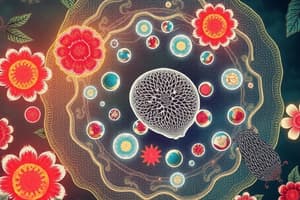Podcast
Questions and Answers
What are cell organelles?
What are cell organelles?
Cell organelles are membranous compartments inside the cells of living organisms.
What is the function of the cell membrane?
What is the function of the cell membrane?
The cell membrane surrounds the cell and selectively screens the kinds of substances that go in and out.
What is cytoplasm?
What is cytoplasm?
Cytoplasm is a gel-like substance made from dissolved proteins and liquid that encases the cell.
What is the role of the nucleus in eukaryotic cells?
What is the role of the nucleus in eukaryotic cells?
The nucleolus is a sub-organelle of the nucleus composed of proteins and ribonucleic acids (RNA).
The nucleolus is a sub-organelle of the nucleus composed of proteins and ribonucleic acids (RNA).
Cell organelles are separated __________ compartments inside the cells.
Cell organelles are separated __________ compartments inside the cells.
Which of the following is NOT a function of cell organelles?
Which of the following is NOT a function of cell organelles?
What are cell organelles?
What are cell organelles?
What is the primary function of the cell membrane?
What is the primary function of the cell membrane?
What substance is the cytoplasm primarily made from?
What substance is the cytoplasm primarily made from?
The ______ stores the cell's hereditary DNA.
The ______ stores the cell's hereditary DNA.
The nucleus is found in both prokaryotic and eukaryotic cells.
The nucleus is found in both prokaryotic and eukaryotic cells.
What role does the nucleolus play?
What role does the nucleolus play?
Flashcards are hidden until you start studying
Study Notes
Cell Organelles Overview
- Cell organelles, known as little organs, are membranous compartments within cells of living organisms, crucial for various cellular functions.
- Key functions of organelles include maintaining cell shape, storing nutrients, manufacturing proteins, harvesting energy, repairing cell parts, and digesting substances.
Functions of Cell Organelles
- Maintain structural integrity of cells.
- Serve as storage sites for vital nutrients.
- Synthesize proteins essential for cellular functions.
- Convert energy for cellular processes.
- Facilitate repair mechanisms for damaged cellular components.
- Break down and digest various substances.
Major Cell Organelles
-
Cell Membrane
- Surrounds the cell and selectively regulates the entry and exit of substances.
-
Cytoplasm
- Gel-like substance composed of dissolved proteins and fluids that fills the cell, providing a medium for cellular processes.
-
Nucleus
- Present only in eukaryotic cells; it houses the cell's hereditary DNA and governs cellular activities such as growth, metabolism, and reproduction.
- Nucleolus: A sub-organelle within the nucleus composed of proteins and RNA, responsible for synthesizing ribosomes.
Cell Organelles Overview
- Cell organelles, known as little organs, are membranous compartments within cells of living organisms, crucial for various cellular functions.
- Key functions of organelles include maintaining cell shape, storing nutrients, manufacturing proteins, harvesting energy, repairing cell parts, and digesting substances.
Functions of Cell Organelles
- Maintain structural integrity of cells.
- Serve as storage sites for vital nutrients.
- Synthesize proteins essential for cellular functions.
- Convert energy for cellular processes.
- Facilitate repair mechanisms for damaged cellular components.
- Break down and digest various substances.
Major Cell Organelles
-
Cell Membrane
- Surrounds the cell and selectively regulates the entry and exit of substances.
-
Cytoplasm
- Gel-like substance composed of dissolved proteins and fluids that fills the cell, providing a medium for cellular processes.
-
Nucleus
- Present only in eukaryotic cells; it houses the cell's hereditary DNA and governs cellular activities such as growth, metabolism, and reproduction.
- Nucleolus: A sub-organelle within the nucleus composed of proteins and RNA, responsible for synthesizing ribosomes.
Studying That Suits You
Use AI to generate personalized quizzes and flashcards to suit your learning preferences.





